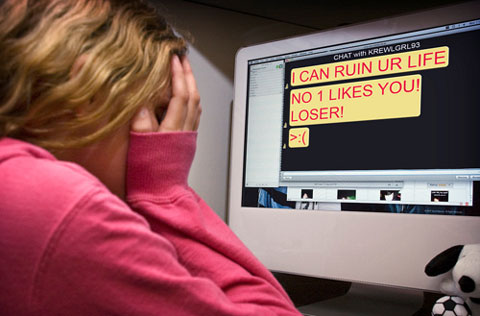Cyberbullying is the deliberate and repeated threatening, harassment, humiliation, defaming (by spreading of rumors), and victimizing of an individual through the use of technology such as the internet, text messages, cameras, etc. over a period of time.
Cyberbullies do not usually act alone, they are often backed by other cyberbullies or an audience that views, cheers and urges them on. The bullies also typically press family members and friends offline to harass and confront the subject of their aggression and to gang up against them.
Victims of cyberbullying report feeling humiliated, angry, sad, and defenseless. Cyberbullying affects victims’ self-esteem (lowers it) and some report feeling guilty as if it is somehow their fault. Some victims have also reported feeling suicidal. According to Reachout.com, other common feelings include, “Feeling alone, like there is no one to help you; Feeling like you don’t fit in with the cool group; Feeling depressed and rejected by your friends and other groups of people.”
While studies show that 1 out of every 3 kids has had mean things said about them online, Laura Johnson Hommell writes in an article entitled ‘Cyber-bullying: What It Is and How to Prevent It’: “Not only do children have to worry about these threats, but adults are also falling victim to people who think that using technology to carry out their threats affords them anonymity and ways to victimize others while avoiding the consequences of their actions.”
While cyberbullying can be extremely difficult to deal with, the victim can take control and rise above it. Here’s what you need to know:
- You are not alone! Be calm, and remember that you are not alone. This can happen to anybody. Bullying happens everywhere, everyday. With the widespread use of the internet and other technological strides, more and more people are being victimized by these bullies who by the click of a mouse are able to propagate falsehoods and instill fear across the world. Do not be afraid, and refuse to be a “victim” … such feelings are fodder for the bully. Also, never apologize for being attacked or try to reason with your tormentor. Seek support from loved ones and/or spiritual healing from your church, mentors and friends.
- Ignore! Chelsea Itson, a former bona fide cyberbully who repented of her ways, gives this candid advice, “The most important thing to remember about dealing with cyberbullying is to never, ever respond to the bully. I know it’s difficult to do… Remember that bullies are often lacking something crucial in their lives and they seek pain in others, so do not fill this void for them by giving them a reaction. Your reaction is exactly what they are seeking. Instead, document everything, and seek the proper authorities (up to and including your local FBI bureau). Trust me, I know it is very, very difficult to not react when you see yourself and the people you love being attacked … The bully will often tell their prey things such as “you deserve this” and “you need help” in order to convince you that you are in fact the bad person. Just remember who it is you are dealing with and report everything to the proper authorities so the real “bad person” can be dealt with legally.
- Know your options. In an article on eHow.com Rachel Murray advises, “Save all messages sent by a bully … messages sent on the Internet can be traced by the police and Internet service providers through the bully’s Internet Protocol address. Keeping a record will show how often the bullying occurs, when it occurs and by whom. Report the cyberbully to the authorities including the local police and the victim’s school if he is a student. Many state senates have passed bills that require school districts to expand their bullying policies to include cyberbullying, according to the Social Safety website.”
- Block! Block their emails, delete them from your friend list and use privacy settings on social media sites like Facebook to cut off all communications with these bullies and their cronies. Consider logging off the cyber world for a while to focus on life off-line as you heal and realign yourself with the important aspects of your precious life and existence.
- Build character. Think of this run-in with a cyberbully as just another growth phase of life. Ignoring, overcoming and moving on will help build your character and develop inner strength. Reach out to other victims to share experiences and to support each other. Speak out and help empower those in similar situations by refusing to be a quiet onlooker. Cyberbullies do not like being called out — speaking out definitely reduces the risk of someone else being tormented in this way.
Vctims of cyberbullying should always remember that they are not at fault and are certainly not deserving to be bullied. DUNIA Magazine stands against all forms of Cyberbullying.
DUNIA POLL: Tell us…
![]() Loading ...
Loading ...

